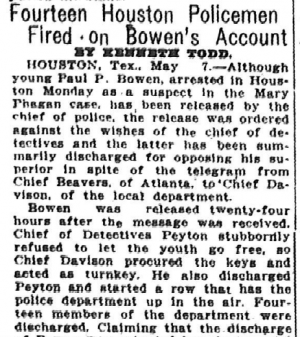 Another in our series of new transcriptions of contemporary articles on the Leo Frank case.
Another in our series of new transcriptions of contemporary articles on the Leo Frank case.
Atlanta Journal
Wednesday, May 7th, 1913
BY KENNETH TODD.
HOUSTON, Tex., May 7.—Although young Paul P. Bowen, arrested in Houston Monday as a suspect in the Mary Phagan case, has been released by the chief of police, the release was ordered against the wishes of the chief of detectives and the latter has been summarily discharged for opposing his superior in spite of the telegram from Chief Beavers, of Atlanta, to Chief Davison, of the local department.
Bowen was released twenty-four hours after the message was received. Chief of Detectives Peyton stubbornly refused to let the youth go free, so Chief Davison procured the keys and acted as turnkey. He also discharged Peyton and started a row that has the police department up in the air. Fourteen members of the department were discharged. Claiming that the discharge of Bowen was actuated largely by spite and before a thorough investigation had been made local Pinkerton’s agents as well as private detectives are doing some work on their own accord.
The row between the chief of police and the chief of detectives was caused when the latter gave out the story to an afternoon paper without consulting the head of the department and mentioning his name.
* * *
Atlanta Journal, May 7th 1913, “Fourteen Houston Policemen Fired on Bowen’s Account,” Leo Frank case newspaper article series (Original PDF)











 Another in
Another in  Another in
Another in  Another in
Another in  Another in
Another in  Another in
Another in  Another in
Another in  Another in
Another in  Another in
Another in  Another in
Another in